If you would like your free copy of “Cheaper Than A Seminary Education,” a 45-page e-book on reading difficult passages of Scripture in context, sign up for my weekly newsletter here. If you decide it’s not for you, you may unsubscribe at any time.
Here are a couple of Advent sermons for your reading pleasure as we await the Second Sunday of Advent. Enjoy.
John 1:26-27 (From The Message)
26-27John answered, “I only baptize using water. A person you don’t recognize has taken his stand in your midst. He comes after me, but he is not in second place to me. I’m not even worthy to hold his coat for him.”
Chipping Away At the Darkness
A legend of Michelangelo says that his patron looked upon the finished sculpture of David and asked, “How on earth did you carve such a realistic sculpture?”
Michelangelo replied, “It was easy. I took a big piece of marble and carved away everything that didn’t look like 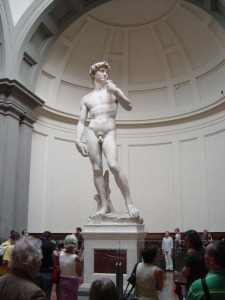 David.”
David.”
The Gospel writer John, telling us his Christmas story of the Word becoming “flesh and blood and moving into the neighborhood” (The Message) begins with the other John, the cousin of Jesus, and begins to chip away at all that is not Jesus.
Nope, I’m not the Messiah, John says.
Nope, I’m not the Light; no, I’m not Elijah, no, I’m not the prophet.
John, in the tradition of the prophets, presents himself as next to nothing, just a voice, “thunder in the desert,” a sound that comes before the life-giving rain. Amos said, “I’m only a shepherd;” Moses said, “I can’t speak well enough;” Jeremiah said, “I’m too young.” John says, “I’m not worthy.”
That’s not the response we would expect from someone who is about to get a ticket for baptizing without a license. We might expect him to flash his credentials, to defend himself, to say, “Hey, I’ve got a right to be here! God sent me!” Instead, the voice crying out in the wilderness echoes Isaiah who resisted his call, saying, “I am a man of unclean lips.”
It’s the third Sunday of Advent, and we’re about ready to hear Luke’s version of the Christmas story, about Mary and Joseph going to Bethlehem, ending up in a stable where Mary gives birth with all the farm animals, then the shepherds coming to tell them what they heard from a chorus of heavenly angels.
But, that’s not how John tells it. If all we had was this gospel, our Christmas pageants would be easy: just one child, standing on a dark and empty stage, reciting or singing about the light:
“In the beginning was the Word,
and the Word was with God,
and the Word was God.”
And instead of Joseph and Mary riding into Bethlehem, as we imagine, on a donkey, in the Gospel according to John, there’s just one guy, the other John, maybe not even visible, but just a voice out of the darkness, because he is not the light, but a witness to the light.
Which brings us to the reason the temple police came all the way out from Jerusalem to Bethany, some backwater village known for its lepers and outcasts: “If you are not the Messiah, not Elijah, not the prophet, why do you baptize?”
John’s answer, of course, is a non-answer. He doesn’t tell them why he baptizes; instead, he tells them that those who are baptized with water are a preview of the One who comes after him.
A few years ago, I served a congregation as it went through a building project that included a small chapel. The building committee counted the cost, listened to ideas from the whole congregation, prayed and discussed and tried to discern the shape of a building that would serve as a tool for ministry in the decades to come. The architect, began to draw. The committee looked at the drawings and said, “We like this; this part, not so much.” The architect drew some more. He drew the floor plan, then the elevation from each direction, then more detailed drawings for the plumber and electrician. By the time we broke ground, we had a stack of drawings an inch thick.
I studied the drawings carefully and felt like I knew this building. I knew what it would look like inside and out, and I knew how it could be used.
And then, after construction had continued for a few weeks, I drove up one morning and the framing was underway. By that afternoon, the walls and the joists were all together and it looked like a building.
When I walked through, and came into the middle room on the north side with the vaulted ceiling, I realized that the drawings were just pointing to the space. They could give us information, they could describe the space, but they were not the same as walking into a place that instantly opened all my senses to the presence of something Holy.
Looking at the drawings, I knew that the middle room would be pretty.
Walking into the space, I felt the need to worship God.
That’s something like what John is saying about baptism with water. It’s the architectural drawing. We who are baptized are not the light; we’re not Elijah, we’re not the Messiah. We are people with ordinary names. Like architectural drawings, those names may be beautiful. And all together, we are called the church, the body of Christ. But, we are not Christ. We are not the light, we only point to the light, the Word made flesh and blood.
In a culture where Christmas has become primarily a marketing event, we in the church have to struggle to keep our attention on the light to which John pointed. At a time of year when the days are short and the night is long; when all the music and merriment can emphasize the loneliness and heartache for those on the sidelines, it is a struggle to focus on the incarnation, the Word made flesh in Jesus Christ.
If your Christmas tradition includes giving to organizations that are changing the world, you may have noticed must how much need there is in this world. Browsing through the Alternative Christmas Market catalogue could be a downer. Without a faith in the light of the world, it would be easier to keep our spirits up through the darkest time of the year if we tried not to think about the intractable poverty of the people of Haiti; tried not to look at the haunting photograph of a child sold by her parents as a sexual slave; if we tried to forget about people who will spend this Christmas on the street or in homeless shelters.
For some among us today, this is the first Christmas after the death of a loved one. For those in the still-fresh pangs of grief, the merriment of the season can deepen the sadness of all we have lost.
This, however, is the darkness into which the light of Christ came. The light of God, the Christmas light, God made flesh, came into deep darkness. The good news of Advent is that the light still enters the dark. With the Christmas story of John, we have no fear of the dark; the darkness of the world is like bits of stone that Michelangelo carved away from the marble to reveal his vision of David.
As those who are baptized with water, we chip away at the darkness with the faith of those who know that the light is breaking through in Jesus Christ.
Thanks be to God.
If you would like your free copy of “Cheaper Than A Seminary Education,” a 45-page e-book on reading difficult passages of Scripture in context, sign up for my weekly newsletter here. If you decide it’s not for you, you may unsubscribe at any time.
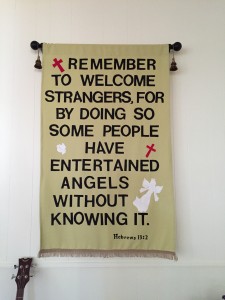
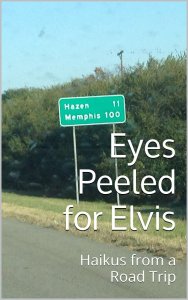


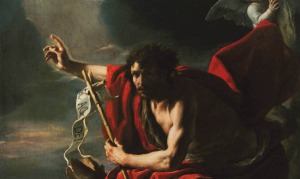
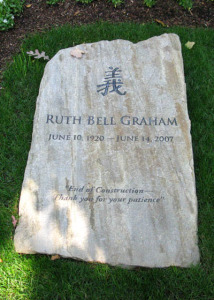 everal miles of road construction. There was one-lane traffic, there were detours, it was a little frustrating. Finally, they came to the end and they saw a road sign. Ruth Graham turned to her husband and said, “Those words, on that road sign, that is what I would like to have printed on my tombstone.” The words on the road sign read:
everal miles of road construction. There was one-lane traffic, there were detours, it was a little frustrating. Finally, they came to the end and they saw a road sign. Ruth Graham turned to her husband and said, “Those words, on that road sign, that is what I would like to have printed on my tombstone.” The words on the road sign read: